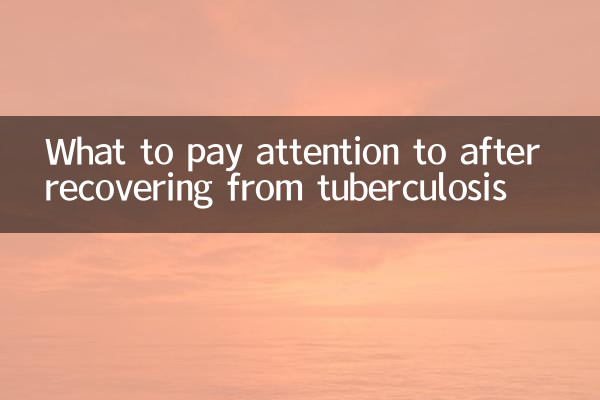What to pay attention to after recovering from tuberculosis
Tuberculosis is a chronic infectious disease caused by Mycobacterium tuberculosis, which mainly affects the lungs but can also affect other organs. Although modern medicine has been able to effectively treat tuberculosis, post-recovery care and precautions are equally important. The following are things you need to pay attention to after recovering from tuberculosis to help patients recover better.
1. Dietary precautions after recovery from tuberculosis

Diet is an important part of tuberculosis recovery. A reasonable diet can help patients regain their physical strength and enhance immunity. The following are dietary recommendations after recovering from tuberculosis:
| food category | Recommended food | Things to note |
|---|---|---|
| high protein food | Eggs, milk, lean meat, fish | Avoid excessive intake to avoid increasing the burden on the kidneys |
| Vitamin-rich foods | Fresh vegetables and fruits | Avoid raw and cold foods to avoid irritating the gastrointestinal tract |
| high calorie food | Nuts, whole wheat bread | Eat in moderation to avoid obesity |
2. Living habits after recovery from tuberculosis
Good living habits are crucial to tuberculosis recovery. Here are some lifestyle habits to pay attention to:
| living habits | specific suggestions |
|---|---|
| Work and rest routine | Ensure 7-8 hours of sleep every day and avoid staying up late |
| moderate exercise | Choose low-intensity exercise such as walking and yoga and avoid strenuous exercise |
| Quit smoking and drinking | Tobacco and alcohol can damage lung health and should be strictly prohibited during recovery |
3. Review and follow-up after recovery from tuberculosis
After recovering from tuberculosis, regular review is the key to ensuring that the condition is stable. The following are recommendations for review and follow-up:
| Review items | Review time | Things to note |
|---|---|---|
| Chest X-ray | Once every 3 months | Observe changes in lung lesions |
| Sputum test | Once every 6 months | Make sure it’s negative for Mycobacterium tuberculosis |
| liver function test | Once every 3 months | Monitor drug side effects |
4. Psychological adjustment after recovery from tuberculosis
After recovering from tuberculosis, patients may face psychological stress, such as worries about relapse or infecting others. Here are some suggestions for psychological adjustment:
| psychological problems | Adjustment method |
|---|---|
| anxiety | Communicate with family and friends and seek psychological support |
| depressed mood | Join interest groups and develop new hobbies |
| social phobia | Gradually resume social activities and enhance self-confidence |
5. Home protection after recovery from tuberculosis
After recovering from tuberculosis, family protection is equally important, especially to avoid infecting family members. Here are some home protection suggestions:
| protective measures | specific suggestions |
|---|---|
| Ventilation | Open windows for ventilation 2-3 times a day, 30 minutes each time |
| personal hygiene | Wash your hands frequently and avoid spitting |
| Disinfection of tableware | Patient tableware should be used separately and disinfected regularly |
6. Drug management after recovery from tuberculosis
After recovering from tuberculosis, some patients may need to continue taking medications to prevent recurrence. The following are recommendations for medication management:
| drug type | How to take | Things to note |
|---|---|---|
| antituberculosis drugs | Take it on time as directed by your doctor | Avoid missing doses or stopping medication without permission |
| Liver protective drugs | Check liver function regularly | If there is any abnormality, seek medical treatment promptly |
After recovering from tuberculosis, patients need comprehensive care from multiple aspects such as diet, living habits, review and follow-up, psychological adjustment, family protection and drug management. Only by paying full attention to these matters can we ensure the stability of the condition, avoid recurrence, and ultimately restore health.

check the details

check the details